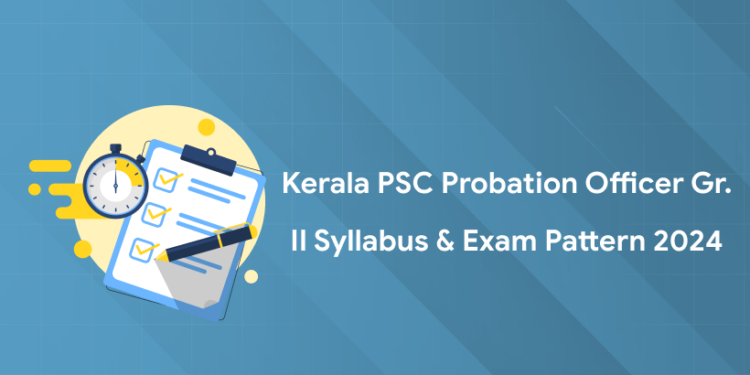Table of Contents
The Kerala Public Service Commission (Kerala PSC) has officially released the syllabus and exam pattern for the Probation Officer Grade 2 examination under the Social Justice Department (Category No. 577/2023). Set for November 19, 2024, from 7:15 AM to 9:15 AM, this exam is crucial for aspiring candidates.
In this blog, we will outline the key topics and exam structure, providing essential insights for effective preparation. Let’s get started!
PROBATION OFFICER ONLINE COACHING – FREE DEMO
Kerala PSC Probation Officer Grade II Exam 2024: Highlights
| Event | Details |
| Name of Exam | Social Justice Department |
| Category Number | 577/2023 |
| Conduct By | Kerala PSC |
| Exam Organizing Body | Kerala Public Service Commission (KPSC) |
| Level of Exam | State Level |
| Qualification Required | Graduation Degree in any Discipline |
| Age Limit | 18-36 Years |
| Notification Release Date | December 29, 2023 |
| Admit Card Release Date | 05/11/2024 (Tuesday) |
| Exam Date | 19/11/2024 (Tuesday) |
| Mode of Exam | Online |
| Language | English |
| Exam Duration | 1 Hours 30 Minutes |
| Official Website | keralapsc.gov.in |
Kerala PSC Probation Officer Grade II Syllabus 2024 PDF
You can access the detailed syllabus for the Kerala PSC Probation Officer Grade 2 examination by clicking the link below. This PDF document provides comprehensive information on the subjects and topics you need to study, ensuring you’re well-prepared for the exam. Be sure to review it thoroughly to align your preparation strategy with the required curriculum.
The Kerala PSC Probation Officer Grade 2 Exam Date 2024
The Kerala PSC Probation Officer Grade 2 examination is scheduled for November 19, 2024, which falls on a Tuesday. The exam will take place from 7:15 AM to 9:15 AM. It’s important for candidates to arrive at the exam center well ahead of time to ensure a smooth check-in process. Make sure to prepare in advance and keep this date in mind as you finalize your study plans!
The Kerala PSC Probation Officer Grade 2 Hall Ticket 2024 – Release Date
The Hall Ticket for the Kerala PSC Probation Officer Grade 2 examination will be released on November 5, 2024. Candidates must download their hall tickets ahead of the exam date to ensure they have all the necessary information, including exam center details and timing. Be sure to check the official Kerala PSC website on this date to access your hall ticket and complete your preparations for the upcoming exam!
Kerala PSC Probation Officer Grade 2 Previous Question Papers – PDF
| Question Paper Category | |
| 221/2017 |
Kerala PSC Probation Officer Grade 2 Exam Pattern 2024
The Kerala PSC Probation Officer Grade 2 examination consists of multiple-choice questions (MCQs) designed to assess the candidates’ knowledge and understanding of various subjects relevant to the role.
| Aspect | Details |
|---|---|
| Total Marks | 100 |
| Duration | 2 hours (7:15 AM to 9:15 AM) |
| Question Format | Multiple-choice questions (MCQs) |
| Sections | Topics |
| – Part I | General Knowledge, Current Affairs, and Renaissance in Kerala (20 marks) |
| – Part II | Sociology (40 marks) |
| – Part III | Social Work (40 marks) |
Kerala PSC Probation Officer Grade II Syllabus 2024: Detailed
Prepare effectively with a clear understanding of the key topics and subjects included in the syllabus. Here’s what you need to study:
PART I – GENERAL KNOWLEDGE, CURRENT AFFAIRS, AND RENAISSANCE IN KERALA (20 MARKS)
General Knowledge and Current Affairs
- Salient Features of the Indian Constitution
- Preamble: Significance and role in interpretation.
- Fundamental Rights and Directive Principles of State Policy: Their relationship and Fundamental Duties.
- Structure of Government: Executive, Legislature, and Judiciary at Union and State levels.
- Centre-State Relations: Legislative, Administrative, and Financial aspects.
- Services under the Union and the States.
- Emergency Provisions.
- Amendment Provisions of the Constitution.
- Social Welfare Legislations and Programmes
- Key legislations: Right to Information Act, Prevention of Atrocities Against Women and Children, Food Security Act, Environmental Acts, etc.
- Social Welfare Programmes: Employment Guarantee Programme, Organ and Blood Donation initiatives, etc.
Renaissance in Kerala and the Freedom Movement
- Towards a New Society
- Introduction to English education and the role of missionary organizations.
- Establishment of educational institutions, factories, and printing presses.
- Efforts to Reform Society
- Socio-Religious Reform Movements: SNDP Yogam, Nair Service Society, Yogakshema Sabha, Sadhu Jana Paripalana Sangham, and others.
- Struggles and Social Revolts: Upper cloth revolts, Channar agitation, Vaikom Satyagraha, Guruvayoor Satyagraha, Temple Entry Proclamation, and others.
- Role of the Press in Renaissance
- Influential publications: Malayalee, Swadeshabhimani, Vivekodayam, and more.
- Awakening Through Literature
- Contributions of novelists, dramatists, and poets, along with movements in literature.
- Women and Social Change
- Key figures in women’s reform: Parvathi Nenmenimangalam, Arya Pallam, A.V. Kuttimalu Amma, and others.
- Leaders of Renaissance
- Prominent leaders: Sree Narayana Guru, Ayyankali, Chattampi Swamikal, Mannathu Padmanabhan, and others.
- Literary Figures
- Contributions of writers: Kumaran Asan, Vallathol Narayana Menon, Vaikom Muhammad Basheer, and others.
PART II – SOCIOLOGY (TOTAL 40 MARKS)
MODULE I: Sociology – Nature, Scope, and Significance
- Relationship with History, Economics, Political Science, Anthropology, and Psychology.
- Basic Concepts: Society, Community, Association, Social Structure, Status & Role, Norms and Values.
- Social Groups and Processes: Definitions, types of groups (Primary, Secondary, Reference), and processes (Cooperation, Conflict, Accommodation).
- Social Institutions: Marriage, Family, Kinship, and Religion; their functions and features. (10 MARKS)
MODULE II: Society, Culture, and Social Change
- Types of Societies: Tribal, Rural, Urban, Industrial, Post-Industrial.
- Culture: Definitions, Types (Material and Non-Material), and Socialisation processes.
- Social Control: Types and means, processes of Social Change (Industrialisation, Modernisation, Globalisation, Secularisation).
- Social Stratification: Concepts and Bases; forms such as Caste, Class, Power, and Gender. (10 MARKS)
MODULE III: Methods in Social Research
- Definition, Nature, and Purpose of Social Research.
- Steps in Social Research: Objectivity and Subjectivity issues.
- Research Methodologies: Research Designs, Social Survey, Hypothesis types, Sampling, and Data Collection techniques (Observation, Interview, Questionnaire, etc.).
- Statistical Analysis and Use of Computers in Social Research. (10 MARKS)
MODULE IV: Social Problems in India
- Definition and Importance of Social Problems; Sociological perspectives.
- Key issues: Poverty, inequality, religious and ethnic disharmony, dowry, domestic violence, environmental degradation, crime, and corruption. (10 MARKS)
PART III – SOCIAL WORK (TOTAL 40 MARKS)
MODULE I: Introduction to Social Work
- Definition, Meaning, Objectives, and Goals of Social Work.
- Principles and Assumptions of Social Work.
- Basic and ancillary methods of social work; Tools, Techniques, Skills of a Professional Social Worker.
- Development Psychology: Major theories and developmental tasks in Early and Late Childhood. (10 MARKS)
MODULE II: Working with Individuals
- Philosophy and Principles of Case Work; Ethical issues.
- Phases of the Helping Process: Exploration, Engagement, Assessment, Planning, Implementation, Evaluation, and Termination.
- Models of Case Work Practice: Psychodynamic, Behavioral, Psychosocial, and others. (8 MARKS)
MODULE III: Working with Groups and Community
- Objectives and Principles of Group Work.
- Social Group Work Process: Intake, Study, Goal-setting, Intervention, Evaluation.
- Community Organisation as a Social Work process: Models of Community Organisation and their applications. (12 MARKS)
MODULE IV: Social Work Administration
- Concept and Tasks of Social Work Administration.
- Relevant Legislation: Probation of Offenders Act, Juvenile Justice Act, Child Labour Act, Domestic Violence Act, POCSO Act, and others. (10 MARKS)
How to Download Kerala PSC Probation Officer Grade 2 Syllabus & Exam Pattern
- Visit the official Kerala PSC website.
- Navigate to the “Downloads” or “Syllabus” section.
- Locate the “Probation Officer Grade 2 Syllabus 2024” link.
- Click to download the PDF file.
Preparation & Study Tips for Kerala PSC Probation Officer Grade 2 Exam 2024
- Understand the Syllabus: Familiarize yourself with the entire syllabus to identify key topics and allocate time effectively.
- Create a Study Plan: Develop a timetable that covers all subjects and allows for revision. Stick to this plan consistently.
- Use Quality Resources: Choose reliable study materials, including textbooks, online courses, and previous years’ question papers.
- Practice Regularly: Solve sample papers and take mock tests to improve your time management and get accustomed to the exam format.
- Stay Updated: Follow current affairs regularly through newspapers, news apps, or current affairs magazines, as they are crucial for the General Knowledge section.
- Group Study: Collaborate with fellow candidates for group discussions.
- Revise Frequently: Regularly review what you’ve learned to reinforce your knowledge and identify areas that need more focus.












